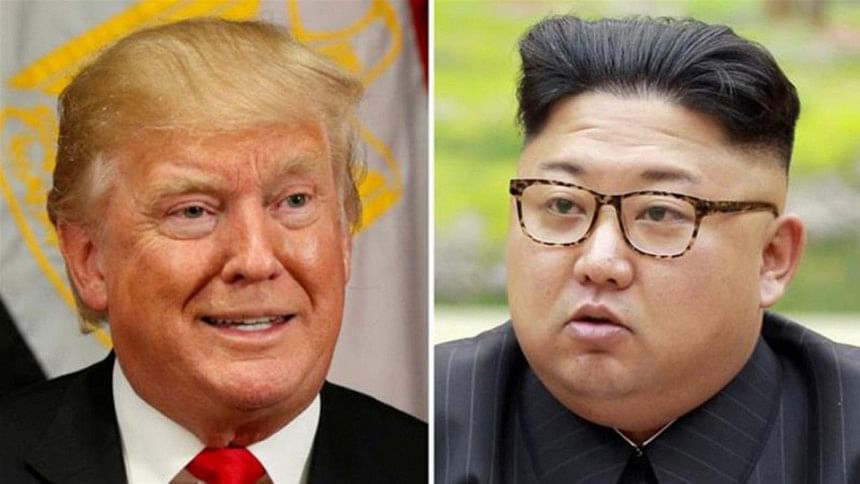Of crises and kite-flying

With only weeks to go before the planned Summit between the two in Singapore on June 12, both US President Donald Trump and North Korean leader Kim Jong-un seemed to be focused on a spot of kite-flying, on the backdrop of crises, to test each other's nerves.
Mr Trump was conveying an impression that a great victory in deal-making, a practice in which he claims to have achieved perfection, was in the process of being won even before the negotiations commenced. In a series of articulations, both verbally and through Twitter, he seemed to be engaged in what appeared to be victory laps by his somewhat baffling confidence in the outcome of the talks a tad prematurely. In return for immediate "denuclearisation" (despite the fact that same words often mean different things to protagonists in negotiations), he was promising generous handouts to the rivals. Mr Trump's pitch, broadly, was: Give up the weapons that threaten us, and we promise to make you rich. Alas, the opponent was not on the same page!
For Mr Kim might have watched and concluded that the other side did not have a good record of keeping promises. The case of Iran could have come to his mind. Also, the unnerving recollections of the experiences of Iraq and Libya. So he might have seen wisdom in buttressing his faith, as any soldier as exhorted by Oliver Cromwell would, in his adversary by also keeping his powder dry! Mr Kim took time to react, and when he finally did, Mr Trump was, surprisingly, or unsurprisingly, as some analysts would contend, caught off guard.
Mr Kim may have calculated that it would be imprudent to give up all his options, and then to wait for the reward afterwards. He might have gauged that the only reason he has been invited to travel to Singapore to meet his opponent was his wherewithal to be able to strike at the latter. It was unlikely therefore that he would give up that capability so readily and place himself at the mercy of the goodwill of his perceived foe, of which the recent examples, to him at least, appear to be hard to come by.
For instance, as some would assume not unreasonably, Mr Kim has reacted negatively to the military manoeuvres by the US and South Korea in the neighbourhood. The somewhat daunting name given to it—Max Thunder—could not but have dented his sense of security. He did not buy that it was routine. In light of engaging in peacemaking processes in the upcoming talks, routine acts of seeming hostility would be viewed as unfriendly signs in Pyongyang.
More importantly, the reference to the "Libyan model" would have seriously disturbed Mr Kim. In all fairness to Mr John Bolton, the US national security adviser who, when he had brought it up first, had actually the 2003 agreement between the US and Libya in mind. In accordance with that the Libyans were to transfer their rudimentary nuclear centrifuges to be dismantled. But his political master, Mr Trump, who did not perhaps care to check things out just as he is wont not to do, gave it an interpretation that may have actually confirmed the North Korean's worst fears: "The model, if you look at the model with Gaddafi," Mr Trump sought to explain, erroneously and quite unnecessarily, "was that of total decimation. We went there to beat him. Now that model would take place if we don't make a deal, most likely." Mr Kim was not amused.
His sentiments were reflected in an unambiguous message from Mr Kim Kye-gwan, his vice minister for foreign affairs. This Mr Kim said: "We are no longer interested in a negotiation that will be all about driving us into a corner and making a one-sided demand for us to give up our nukes and this would force us to reconsider whether we should accept the North Korea-US Summit meeting." This was a Parthian shot, not fired at the end of a battle, but prior to engagement. This may have dampened the euphoric expectations that the achievement by US negotiators of a North Korean nuclear disarmament involving a "complete, verifiable and irreversible dismantlement" was just around the corner. But it may have perhaps helped to bring a more realistic situation to the fore.
The prospects of the Summit are by no means dead. But the recent exchanges are a wake-up call to all sides to be calm and rational, and not to assume that the other side is weaker and desperate to reach an agreement. Both parties will come to the table—as is hoped they will despite the exchanges—with the belief that a bad deal is worse than no deal at all.
North Korea will not easily give up its power of deterrence. Nor will, or should, the US allow for a major erosion of its sense of security only to obtain a result that should temporarily find a positive electoral or diplomatic resonance. When Greek meets Greek, then comes the tug of war. That test of physical and intellectual strength may begin but not necessarily end in Singapore this June.
Dr Iftekhar Ahmed Chowdhury is former foreign adviser to the caretaker government and is currently principal research fellow at the Institute of South Asian Studies, National University of Singapore.

 For all latest news, follow The Daily Star's Google News channel.
For all latest news, follow The Daily Star's Google News channel. 



Comments